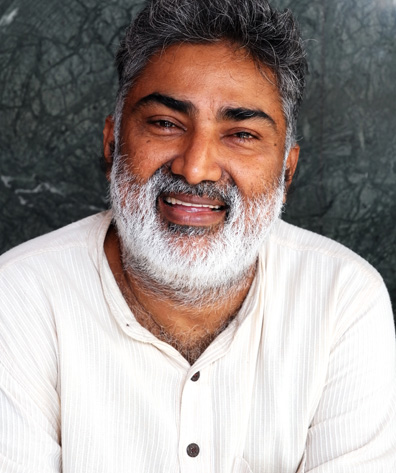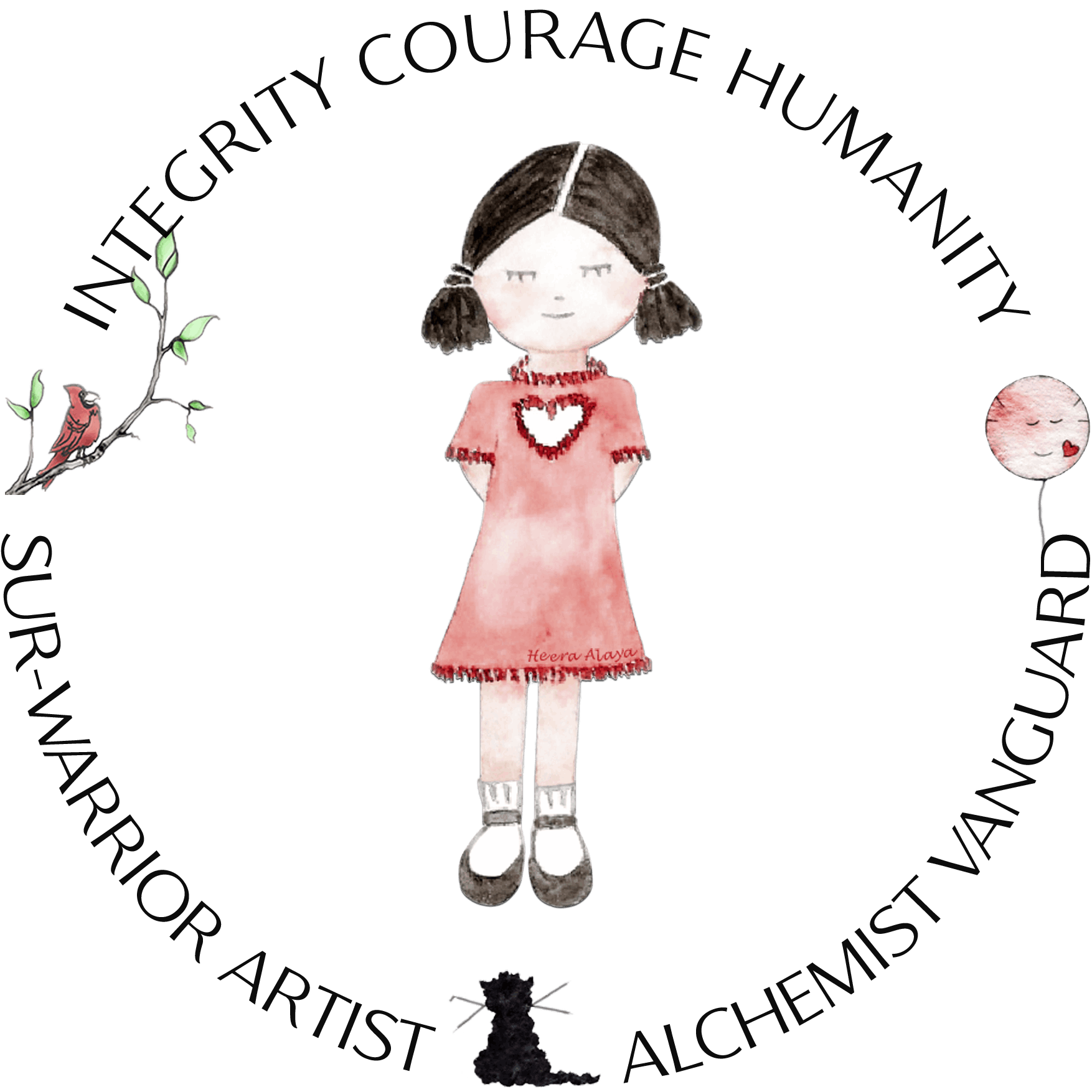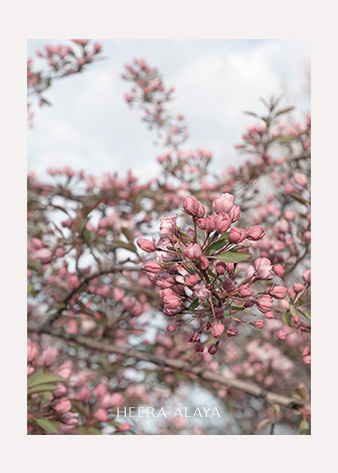
“We know of a baby who was raped;
the charges against this baby
were that she was seducing men.”
AJEET SINGH and SANTWANA MANJU
Activist and Rescuer, Guria, IN
January 1st, 2021
OPEN WINDOWS | In Conversation
Activist Ajeet Singh, the recipient of the Mother Teresa Memorial Awards for social crusaders, is the founder of Guria, an NGO [non-governmental organisation] that works towards combatting human trafficking and the sexual exploitation of children and women. Santwana Manju works with Guria as a rescuer and counsellor. Ajeet Singh and Santwana Manju’s belief in the power of commitment is compelling, and their rigour in catalysing a better future for children and women is commendable.
Ajeet Singh: Yours is an extraordinary life. Tell me, Heera, why did you quit acting?
[Silence]
Heera Alaya: Ajeetji, I don’t particularly appreciate indulging in movie talk; it makes me uncomfortable. However, I will make an exception for you and the naive young girls who foster dreams of becoming heroines. But first, let me get a few things out of the way.
To begin with, you can’t beat destiny. I didn’t have a clue about movies, let alone wanting to become an actress; I was academically driven. Besides, I wasn’t enamoured by “reel heroes” (I never asked for their autographs or photographs or addressed them as Sahib, Garu or Sar). Everyone stands on equal ground; I don’t make exceptions. Lastly, I worked in five film-hoods; all are untreated sewages overflowing with copious sparkles to deflect what lies beneath perceived glamour and righteousness.
[To keep the focus on my guests and their exemplary work, I will publish my complete answer later. Below is the segue into our conversation.]
HA: As a sensitive young human being, dealing with this level of toxicity and cruelty took a massive toll on my emotional health. So, at a young age, I said: “To hell with the (mostly) illiterate-misogynist-narcissistic-depraved-impotent tadpoles,” and walked away from the predatory pond.
My decisions revolve around protecting my soul and integrity, which puts life in perspective. What I know for sure is that I am the only hero of my life, sporting my punctured and dented armour and walking my talk (it’s another thing that my life journey has the makings of a Hollywood film). Setting myself free is the singular best decision I have made—despite the enormous sufferings that ensued, I am grateful to the universe for honing the qualities essential to honouring life.
Santwana Manju: Fearless individuals like you, who live their lives on their terms, are what we want, and courage and honesty are what people can’t bear. You are living life on your terms. Often, a person is 60 or 70 years old before they realise they were living to please people; by then, it’s too late to change their life.
HA: I value your words of support and encouragement. Thank you, Manjuji.
[In unison] Welcome.
HA: I have been learning about the multiple types of human trafficking and the different vessels employed to traffic victims. Your commitment and involvement toward trafficked victims are beyond laudable. Courageous and inspiring individuals like you are real heroes. It’s entirely my privilege to be in your company.
Santwana Manju and Ajeet Singh: [In unison] Thank you.
Ajeetji, how did you come to name your organisation Guria?
AS: In Hindi, Guria means female doll. After playing, children throw their dolls. We do the same in society—play with the woman and throw her.
When you were 17 years old, you attempted to help a sex worker’s children—Aap ne dil ke bath mane [You listened to your heart].
AS: I connect the mind to the heart, emphasising the heart. I don’t bother with what people say—if what you are doing is correct, you must go ahead.
Your family rebuffed your altruistic actions. Were they concerned about your well-being or the family image?
AS: Like most protective parents, they [Mr Singh’s parents] wanted me to be safe and become a successful bureaucrat, so I ended up at Delhi University. But, overprotection can sometimes become a curse—you have to act and be a certain way. For my parents, on one side, it was about my well-being, and on the other, it was about being part of the system and refraining from dealing with taboo subjects.
Why does society fear taboo subjects?
AS: Society wants to live in a safe monotonous cocoon, lacking creativity in life. Only when you question will you know that you are part of this existence and connect not only to human beings but also to birds, rivers, mountains, and bees. This art of connecting is crucial. Only by questioning people can we be creative and innovative. Jesus, Moses, Buddha, Mohammed and Kabir were ahead of their times and not accepted by society; they were hanged and killed.
Society’s rejection and threats shouldn’t deter you; you must question and create.
What do you admire about Manjuji?
AS: Change-makers and whistle-blowers often have to walk alone. In Manju, besides having excellent support, I have a person I can trust blindly. Good people like Manju, who are independent and courageous, are hard to come by.
Manjuji, how did you come to join Guria?
SM: I had no intention to get married; I was keen to continue my social work [with an orphanage] and adopt two children. But all that changed when my life crossed paths with Guria. On the first day I taught at Guria— when the children asked me to return the next day—I realised I had landed my dream job. I wanted to be his [Ajeet Singh’s] steadfast supporter.
On learning of my decision to join Guria, the director of the SOS orphanage scolded me and threatened to kick me out without paying me. I told him [orphanage director] to go to hell. Guria offered me 1,500 rupees. I told him [Ajeet Singh] point-blank: “I want to join you, but now I don’t even have a roof on my head; you have to provide shelter,” and he agreed. The room that we are sitting in now was my room.
What was it about Ajeetji that convinced you to join Guria?
SM: His [Ajeet Singh] passion and craziness are extraordinary, and I joined Guria thanks to his drive, commitment and sincerity with which he serves humanity.
Ajeetji, you are fortunate to have found Manjuji, who is on your wavelength.
AS: True. I was already 34 or 35 when I met her [Manju].
Age is just a number.
AS: True. I have always been defiant. As you shared earlier, I didn’t want to get married to produce children; I wanted to live on my terms.
I have paid a steep price for being my person.
You use art as therapy for children at Guria. What is it about art that makes children receptive?
AS: When you create art—gardening and writing are also art—your fingers move, and you create from the heart and the soul. I plant ideas and encourage children to draw natural elements (instead of buildings); in the process, children shrink, becoming part of trees and birds. The children at Guria were some of the most violent, but they have now been transformed by art.
Guria is based in Varanasi [a city in Uttar Pradesh, also known as Benaras or Kashi]. What makes Varanasi—a sacred Hinduism pilgrimage site—a destination for the flesh trade? Are locals and visitors aware of the scale of child trafficking and child prostitution in this holy city?
SM: Benaras has one of the largest brothels in the world. The sex trade in Benaras is flourishing because of sex tourism and industrialisation. And yes, people are aware of trafficking and child prostitution in Benaras.
Moksh pana hai toh Varanasi jana hai [To attain salvation, one must visit Varanasi]. These pilgrims must also think that when they have committed a lifetime of sins, they might as well commit few more—engage in prostituted sex—and wash their collective sins in the river Ganga.
What is the difference between child prostitution and second-generation prostitution, and how do they tie into sex tourism?
SM: Child prostitution involves children below 18 years of age. In contrast, second-generation prostitution is a vicious circle where the daughter follows in her mother’s footsteps, who works as a prostitute.
AS: Sex tourism takes place wherever tourism is influenced by sex—in red-light areas, highways, hotels, trains, tourist spots, etc. For instance, Benaras is a significant hub attracting foreigners and out-of-state [within India].
What makes human trafficking an invisible crime?
AS: Often, it is people experiencing poverty and the illiterate who are trafficked. If the police catch a woman, she will claim that the man [her trafficker] is her husband—because she truly believes he will marry her once they cross the border, let’s say, Nepal. Only after another six months of wooing her, and into the seventh month, when her trafficker starts beating and pimping her, the woman realises she has been trafficked. Unfortunately, the police can’t help the parents who register a missing person case, as the woman has declared her love for the man. The trafficked woman is used as a shield to protect her trafficker.
How dreadful.
Another deplorable fact in contemporary India is that a new child victim has to provide sexual favours to the police and pay them a monthly fee as a commission.
AS: The people who are supposed to protect girls are part of the crime—the police run the whole business of prostitution. And yes, the girls’ brothel keeper pays a fee to the police, mahina [monthly commission]. This practice [of taking a commission from crimes] is happening in Mumbai [capital of Maharashtra] and Chennai [capital of Tamilnadu]. Girls are supplied [for sex] to hotels, and the police are not only aware, but they also collect their commission from every hotel as well as demand sex favours from trafficked and prostituted girls and women.
You know, Heera, what disturbs me is that the so-called educated people of the civil society don’t know the truth, and not knowing the truth is fatal. Herein lies the problem. The privileged exist like a stone without feelings, in their cocoons, with consumer goods; they are so sucked into consumerism that their minds and souls have been eaten up.
When the educated and successful don’t ask questions, how can an illiterate slave ask any question? The most significant number of people living in slavery—approximately 90% of the population—is in India, which is catastrophic.
In a country [India] plagued with rampant corruption and lack of police enforcement, putting witness protection into motion must be challenging.
AS: Witness protection, a state mechanism, should take care of victims; it’s not my job. Most areas are not my job, but we do most of it in context; we don’t wait for someone to do it. So, we take care of witness protection–shifting victims from one place to another and helping them with a monthly stipend. Only I know (and in some instances Manju) who [the victim] is where.
It must be excruciating to rescue trafficked victims.
AS: When you go to rescue a girl, the criminals don’t welcome you—they make your life miserable. So, one needs to strategise; you must be ahead of the criminals.
True.
AS: No doubt, I have the Gandhian spirit of non-violence, but in today’s context, you have to undertake immense pains to get concrete work accomplished. If two out of 100 employees stay with me, it’s a big thing. My employees complain that I make them do a lot of work. Children and women are raped every day, so yes, there is a lot of work to be done. And the police tell me: “You are not cooperating; you land up [at the police station] every day.”
I land at the police station every day because rapes happen daily.
Remember, I sent you the TIP [Trafficking in Persons] report that comes from America; they have mentioned one of our cases—the life imprisonment for the woman in Agra—
Are you talking about Geeta Rakesh [ex-Superintendent of Government Protection Home]?
AS: Yes. I made a lengthy post [on Geeta Rakesh case] for people to know what it takes to get life imprisonment for one criminal. India can be happy that this story [Geeta Rakesh’s imprisonment] made it into the TIP report, but try to understand the aches and pains that I went through to make that one conviction. Neither did the police help me, nor did the government counsellors support me; instead, I was threatened.
Ajeetji, I empathise with you. A few years back, I wanted to file an FIR [A first information report] against two entitled-hostile families—Currimbhoy’s [Naimet and Karim] and Rajagopal’s [Ashwitha’s mother and Lakshmi’s househusband], who repeatedly harassed me and vandalised my dignity, and going to the police, at an extremely sensitive time in my life, proved fatal. Along with my perpetrators, the complicit police ridiculed and harassed me for months. Like you, I am a doer. I held my own, managed to file an FIR, and without telling anyone, met the DGP [Director General of Police]. I then sent a detailed report and the recordings to….
On learning about the incidents, a “well-connected” friend asked: “Why didn’t you tell me? I would have called so and so.” But that’s the point—why do we need a back door entry to law and order in contemporary India? I firmly believe clout is an infertile ground where self-serving, corrupt cowards congregate. If you [Ajeet Singh and Santwana Manju] and other well-meaning individuals don’t endure the corrosiveness of the complicit-corrupt police [in India], what hope do we give the abused-illiterate-impoverished?
AS: Heera, the police swear and curse at these women [poor victims who approach police for help]. The construction of buildings and roads and the production of automobiles and trains are developments; however, they are not life-centric. The nation is made up of people. Only when you place people at the core—ensure girls and women are not raped; people are not trafficked; farmers don’t commit suicide; people don’t die of hunger; shelters and orphanages are safe, and there is healthcare for all, then you are making life centric growth. A country’s growth should be profound.
What is the worldwide scale of human trafficking?
AS: After arms and drugs, human trafficking, along with prostitution, is the second-largest developed industry in the world. So you can imagine the amount of money that is involved.
What is the role of a trafficker?
AS: Traffickers are at the source point, places like Bihar, Odissa, and Bengal, trapping vulnerable victims with promises of love, making them heroines, securing jobs, etc. Whereas a pimp solicits customers for prostitution, conducting sex transactions at destination points—from brothels to hotels. When a pimp needs a new girl, he travels back [to source point]. In some cases, older women become traffickers themselves—as they don’t have any other option to survive. A woman is trapped in prostitution.
SM: When a woman wants to return to her family, her family rejects her. Even after getting old, if a sex worker attempts to wash utensils in someone’s house, the family will declare: “She [the aged prostitute] has come to spoil my man!” The retired prostitute can’t milk cows as no one will buy from her. So, where is the place for these trafficked and prostituted women? She [the trafficked-prostituted woman] is ostracised at every turn.
SM: Of course, society doesn’t miss a chance to humiliate a woman, and stigma is a way to destroy her. Even if you walk through the lane in the red light area, society will say: “Oh, we saw you in that area.”
A prostitute’s life is so miserable that she can’t even commit suicide—someone is always guarding her, and her money is not hers. You have to understand her [a prostitute’s] pain. In Indian films, the portrayal of prostitutes is unrealistic—she is shown smiling and enjoying herself. If a customer goes past a sulking prostitute, will he go to her for sex?
No, he won’t [seek sex].
SM: So, a woman has to smile.
True.
AS: If she [the prostituted woman] refuses sex, she won’t earn money, and if there is no money at the end of the day, she will be beaten black and blue. And most prostituted women evaporate in old age, resorting to begging and dying on the streets. There has always been a problem with rehabilitating prostitutes as it lacks social sanction.
How is prostitution different within the Bedia community?
AS: Bedia is a traditional village where people in that community—like in Karnataka [SouthWest state of India] where specific communities worship goddess Yellamma and are devoted to the temple, becoming devadasis—practice traditional prostitution.
So the Bedia’s are similar to the Nat community?
AS: Yes. Nat, Bedia, Bachada, and several other communities practice traditional prostitution. Bedia is more extensive in number.
When we spoke last, you mentioned living amidst the Bedia community—
AS: I am living amidst Bedias as an anthropologist conducting a new experiment. Who do you rescue in this [Bedia] community, and from whom? Unlike a red-light area, where trafficked victims are sold and coerced into sex work, the Bedia community practices second-generation prostitution.
Why do specific communities (Nat, Bedia, Bachada) resort to prostitution?
AS: Ours is a caste-ridden society, which has dictated who will do what type of work. You will be a Chamar [Untouchable community] and work in tanneries; you are a Yadav [Peasant-pastoral community], and you will milk cows; you are a Bhangi [Lowest caste], and you will remove human excrement. The unfortunate reality is that we [Indians] have not been able to get rid of that nonsense [caste system].
Does a runaway child—sexually and physically abused by family and re-victimised at every corner by society—have any option left in life?
AS: The only option is to go to government homes.
But children are sexually, physically, and emotionally abused within the four walls of government homes. What’s the solution?
AS: First, despite development, humanity is absent. A civilised society is missing because of the standard of people we are encouraging and the type of society we are building. Are 70-plus years of Independence [from British rule] not enough to shape a kinder world?
Second, the entire education system has to be overhauled. Currently, the education system is robotic, creating more violence. A wrong child will assault, rape, harass and create all types of problems in society.
The third is clout, which you mentioned earlier. This sickness [of clout]—you scratch my back, and I will scratch your back—is destroying society. I want society’s framework to change.
In India, a girl’s child is disempowered the second she is born. However, advertising is selling everything from cosmetics to chocolates and clothing packaged as a brand: women’s empowerment, which, in reality, is anti-feminism. What do you make of the disparity between reality and this absurdity?
SM: Take a commercial for a men’s shaving cream; it features women. What’s the connection with the women, and where is the empowerment? In fact, by featuring women in the advisement [men’s shaving cream], you reduce the status of women. Let’s be honest: the only visible marketing strategy is sex, and how does that empower women?
This show—of women’s empowerment—is a lie. Hypocrite advertising uses women for commercial exploitation. Nothing is being done to empower women authentically.
AS: Even women living in big houses and with a lineup of luxury cars are discriminated against.
SM: Another aspect that stops women from getting ahead is that they believe they are made for someone else.
Marriage as a destination?
SM: Yes, it has been drummed into a woman that a knight in shining armour will rescue her! So, a woman’s focus is entirely on getting married.
A woman whose destination is marriage has no dreams, ambitions, or identity.
Only if the mindset changes will the next generation change. Why, in the entire world, are red-light areas filled with women? In every country, from districts to states, a man is sanctioned to have sexual needs. If a woman can decide what she wants to eat, why can’t she dress how she likes? And often, a woman is taunted—you were harassed, raped and humiliated because of the way you were dressed.
So true. Over a decade back, one of the two men I mentioned earlier, a sexually frustrated Brahmin househusband, attacked my dignity: “Are you walking around naked that these office boys [who worked with his wife] will pass vulgar comments at you?” This househusband, on the one hand, revels in dirty jokes—about Brahmin women not wearing underwear, and on the other, claims to lead a sexless life—stating the dog sleeps between his wife and him!! The househusband’s jealous attack on me was a revelation of the status of the women in his family and an indicator of his impotence. Karma is such that tomorrow the sexually frustrated househusband’s daughter could be raped; whose dignity is he going to attack?
SM: I know what you are saying. We know of a baby who was raped; the charges against this baby were that she was seducing men. The police had to blame someone, and the girl victim was the easy target. When a six-year-old child disappears, the police say she must have run away. You are slandering the character of a girl child who can’t wear her underwear correctly on her own. The female is always a whore, and the male is a pure angel.
How do you work toward a shared vision of transforming children’s lives?
AS: Today, we are compiling and putting together reports, power points and projects and going back home, which is wrong. Sure, your [an employee’s] life changes, but the community life doesn’t. Social work cannot function by doing activities mechanically on a 9-to-5 basis. Also, an increasing number of egoistic and self-absorbed people are intoxicated with wealth and power; they are dangerous to humanity.
Fundamental clarity is essential to transform lives—why are you doing what you are doing? My benchmark for value addition is clear: the ethical aspects of life should remain, and harmful elements must be removed.
You witness a great deal of suffering from close quarters. How do you stay upbeat?
SM: With threats against our lives, we can go into depression. Also, as a wife, you become a soft target. So, you have to be mentally stable. Unless you are strong and kicking, how can you help others?
AS: We must have the capacity to handle life and not let problems destroy us. Manage your state of mind, work sensibly, and don’t procrastinate. And yes, be in the moment.
I saw you being in the moment when your daughter sang for us. [Their faces light up at the mention of their daughter.]
AS: Life will be hard when you live on your principles, as we do, so we live in the moment. Tomorrow never comes.
You started your journey by listening to your heart and continue being guided by it. Do you have any message for responsible young adults genuinely concerned about their fellow beings, animals and the environment?
AS: You need money for survival; however, connecting the heart to the mind is more important. Maintain a childlike curiosity throughout life; if not, you will stagnate. And remember, when you get on the path of creation, you will be in the minority.
To demoralise you, the rulers—democracy or monarchy—will oppose you; even your family members and neighbours will oppose you. But you should never give up; instead, you must move inch by inch, making progress.
Manjuji, what’s your message for young adults?
SM: Regardless of the profession you choose, be sincere. If you are a surgeon, don’t operate unnecessarily to make money. If you are an engineer, don’t construct a bridge that will crumble in two years; build one that will last 50 years. And when you pray to god, don’t distribute ladoos and food to balance your karma of making 500 crores through ill gains; pray for the right reasons.
Keep your heart at the core. A person with a clear heart, on seeing a girl/woman being abused, trafficked or prostituted, will attempt to save her, whereas an evil person will assault, harass, and degrade that suffering woman.
The heart and humanity are linked; only a clear heart can steer you in the right direction, which will help serve humanity.
Learn more about Ajeet Singh and Santwana Manju.




